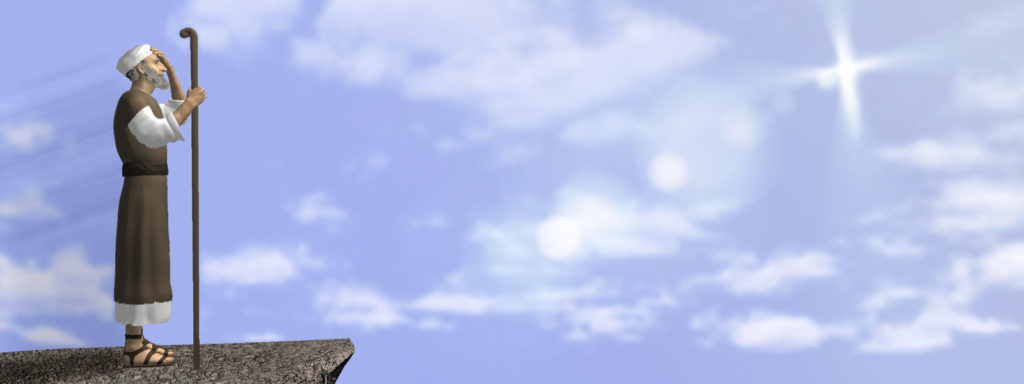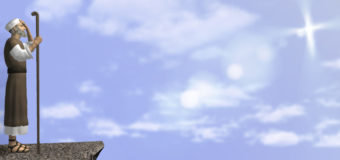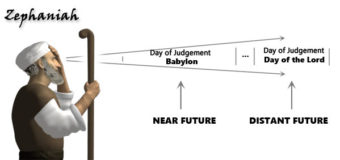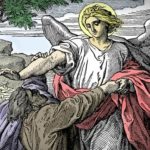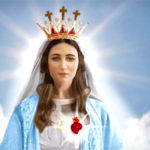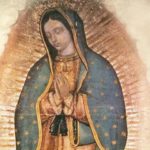Review of the short book of Zephaniah, one of the so-called “minor prophets” of the Old Testament with a special analysis on a noteworthy verse of the first chapter.
The Book of Zephaniah is a book of the Bible. Belongs to the group of the “Minor Prophets” of the Old Testament. It consists of three chapters with a total of 53 verses. It is preceded by Habacuc and followed by Haggai.
Zephaniah 1:12 reads:
*Settle like dregs in wine: those who are overconfident because, like the sediment that settles to the bottom of a bottle of wine, they have remained at peace and undisturbed for a long time.
Because of this verse, the prophet Zephaniah has been represented sometimes holding a lamp in his hand.
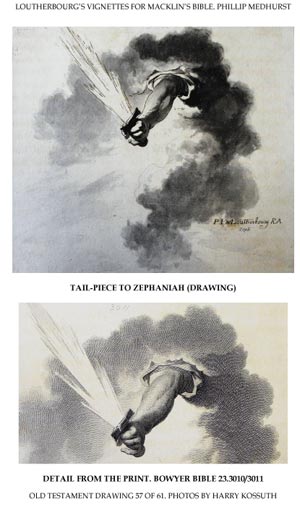
This verse of the book of Zephaniah inspired this article, since the figure of divine examination to the People of God under the light of lamps seems to be a possible reference to the Warning, the event we are waiting to come according to the most recent revelations.
Although it is true that the verse may evoke, for example, a nocturnal siege of Jerusalem under the light of torches (something that could have happened with the destruction of Jerusalem), the verse leaves the door open to a wider range of possibilities, as It has been depicted in the next image by the artist Loutherbourg for the Macklin Bible in the year 1798, an illustration that may resemble the vision of a great comet flying through the skies:
At the present time the situation mentioned in the verse also seems to remain current (1.12 The Lord will do nothing, neither good nor bad!), The general attitude of people who “rest on their dregs”, or deny the existence of God, conforming to atheism or showing disinterest for religion. In other cross references we can appreciate the current validity of these statements:
Ps. 14.1 The fool says in his heart,
“There is no God.”
Their deeds are loathsome and corrupt;
not one does what is good.
Ps. 10:4 In their insolence the wicked boast:
“God does not care; there is no God.”
Is. 29:15 Ah! You who would hide a plan
too deep for the LORD!
Who work in the dark, saying,
“Who sees us, who knows us?”
Jer. 5:12 They denied the LORD,
saying, “He is nothing,
No evil shall come to us,
neither sword nor famine shall we see”
Am. 9:10 All sinners among my people shall die by the sword,
those who say, “Disaster will not reach or overtake us.”
Mal. 3:14-15 You have said, “It is useless to serve God;
what do we gain by observing God’s requirements,
And by going about as mourners
before the LORD of hosts?
But we call the arrogant blessed;
for evildoers not only prosper
but even test God and escape.”
Biblical prophecy often has a present, a near future and a distant future as explained with this image:
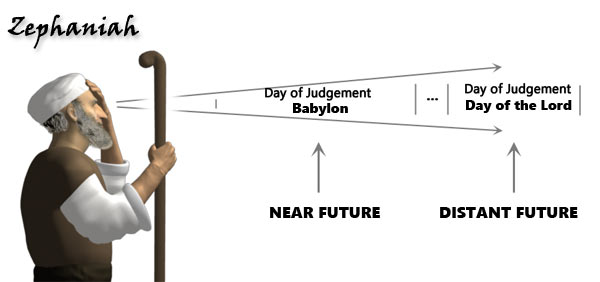
The same forms of idolatry that led Zephaniah to express the divine warnings and the closeness of the “Day of the Lord” seem to be valid for the present times:
- The current lifestyle leads man to be idolatrous following the ways of the Lord but also the ways of the world, worshiping God but also serving the god money and materialism.
- The worship of the stars in the time of Zephaniah, which today has a continuation in astrology and the dissemination of horoscopes as a mode of divination and entertainment, which is superstition and contrary to the Christian faith.
- The worship of Molech, Ammonite’s god in the time of Zephaniah, who was worshiped with human sacrifices, which has its continuation nowadays with the rite commonly known under the term “abortion”, true human sacrifice to false gods, “human sacrifice carried out with white gloves” as Pope Francis calls it. Tolerance to this aberration is undoubtedly one of the most serious mistakes of societies, by which purification becomes inevitable.
- Finally, Zephaniah also criticizes the adoption of the moral values of neighboring nations that reject Yahweh as the only God, whose correlate we have in the increasingly deviated laws and approved “new rights” that introduce anti-Christian values, which are promulgated by legislative bodies, based on modernity and false ideologies.
Who was Zephaniah?
The first verse of the book attributes its authorship to “Zephaniah, son of Cusi, son of Gedaliah, son of Amariah, son of Hezekiah, in the time of Josiah, son of Ammon, king of Judah” (Sof 1: 1). For this reason he is considered a descendant of the family of King Hezekiah.
Zephaniah (in Hebrew Sefanyah means: “Yahweh has kept”, “God has hidden”, “God protects” or “Hidden by God”). This could refer to the fact that God could have protected him in times of Manasseh, king of Judah, who was very corrupt and violent toward religious affairs.
Where and when did Zephaniah preach?
Zephaniah preached to the people of God who had remained in the southern kingdom, known as the kingdom of Judah. By the time he proclaimed the word of God, the Assyrians had destroyed the northern kingdom and its capital city of Samaria. Therefore, his field of action was in Jerusalem and the region of Judah. He was a man who knew very well the city of Jerusalem. His descriptions of specific places indicate that this was the city where he moved with confidence, it is assumed that the capital was the place of his residence, and perhaps his birthplace.
The first v. from the book of Zephaniah situates the activity of this prophet in the time of Josiah, king of Judah (640-609 b.C.). But in his oracles it is spoken of the abuses of Assyrian type idolatrous practices and his preaching does not allude at all to the great religious reform carried out by that king (2 Ki 22.1-23.25), but the customs and practices that he denounces (Zep 1: 4-6) correspond rather to a time strongly impregnated with paganism. Therefore, it is most likely that Zephaniah proclaimed his prophetic message before the reformation of King Josiah, perhaps between 630 and 625 BC.
Judah, deprived of a part of its territory, lived under Assyrian domination, and the ungodly reigns of Manasseh and Amon favored religious disorder. After the years of religious decline under the reign of Manasseh (698-643 BC), Josiah becomes the great restorer and follower of the religious reforms of his great-grandfather Hezekiah. This king fought effectively against necromancers and fortune tellers, banned worship in local shrines to centralize it exclusively in Jerusalem, uprooted the remnants of idolatry, fought against the Assyrian influx, promoted a new religious observance, and managed to widen the kingdom to the north in territories of the destroyed kingdom of Israel.
Probably Zephaniah and Jeremiah were the prophets who urged King Josiah to convert to the Lord, under the warning of imminent destruction. When the book of the Law was found in the foundations of the Temple and Josiah verified that the consequences of not having given obedience to the Law by the ancestors, were becoming a reality, Josiah humbled himself before the Lord and promulgated a Cult Reform that was carried out successfully, banishing idolatrous practices, although for a brief period, until his death.
Topic of Zephaniah
Zephaniah preached not only about the imminent invasion of Babylon, but also of the more distant “Day of the Lord“. That Day is described with somber features, like a day of anger, of anguish and affliction (Zep 1: 15), which will put an end to the evil prevailing on Earth by pride and rebellion, and shake the indifference of those who say: The Lord will do nothing, neither good nor bad! (Zep 1: 12), that is, those passive and indifferent who contemplate the rampant moral corruption (1,1-18; 2,4-15), a day of wrath that will bring the great calamity, not only on Jerusalem, but a universal judgment to every nation, because of the sins of the world.
It is this evil that leads Zephaniah to penetrate, like no other prophet, in the sense and ultimate root of the sin that nests in the hearts of people; not acts, but their motivations: pride, lack of trust in God, arrogance and disloyalty of their prophets, contempt of the Law by priests, falsehood.
Sin, in short, is the breaking of an alliance that had placed the people in an intimate and personal relationship with God. Therefore, the “day of anger” will be a day of clean and start over.
God warns – God acts: God never gives his word without folowing through, either His promises for good in grace, or His assurance of judgment for purification. We should not expect the time gap between the invitation to return to the ways of God and the experience of some consequences of divine judgment on those who ignore Him to last indefinitely. Time is limited and we must focus our priorities and work ordering them accordingly.
But the last word, as in the other prophetic writings, will be an oracle of hope and restoration. First will come the great purification (3,9-13). From it, the evil will be removed and a great restoration will occur, which will be enjoyed by the remnant of the poor and humble who seek the Lord. That is why pagans are also called to join the service of the Lord. The center of the gathering for the dispersed is no longer Mount Zion in its materiality, but the “Name of the Lord”, refuge of the humble people.
In his book, emphasis is placed on the providential control of the nations of the world, the need for purity in forms and to follow the paths of justice as opposed to those of moral corruption and iniquity. The divine judgment and the suffering of imposed penances serve as means of purification for the People of God.
We must examine ourselves, examine our conscience and our hearts in a continuous exercise during our lives. While the Lord keeps our hearts humble, we must as He does, seek the humble among the wicked and invite the wicked to become humble before God so that they reach salvation too.
Images for download:
 To the extent possible under law, DEUNANUBE.COM has waived all copyright and related or neighboring rights to “Zephaniah”.
To the extent possible under law, DEUNANUBE.COM has waived all copyright and related or neighboring rights to “Zephaniah”.
Free to use, modify and publish with or without commercial purpose the following images without requiring any permission.
